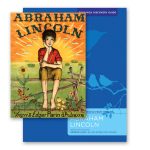Week 1: Abe As a Young Boy
Character Lexicon
- gentle: having or showing a mild, kind, tender temperament or character
- witty: showing or characterized by quick and inventive verbal humor
- literate: able to read and write
- contemplative: expressing or involving prolonged thought
- hardworking: tending to work with energy and commitment
Comprehension Questions
- The kinfolk who came to see young Abraham Lincoln described him as “solemn like a papoose.
- Before Abe had his first pair of pants he had learned to help on the farm.
- After learning how to read and write at age six Abe didn’t go to school much.
- When Abe was nine and a dangerous came to the wilderness, his mother took sick and died.
- Abe practiced reading and writing in the flickering light of the fireplace.
- Abe often stayed alone in the woods for day at a time chopping timber and enjoying the peace and quiet, which allowed him to think and dream.
- Abe got the white scar over his eyebrow fighting off five vicious pirates who tried to rob the boat he was on.
Week 2: Adult Life
Character Lexicon
- clever: quick to understand, learn, and devise and apply ideas; intelligent
- strong: having the power to move heavy weights; able to withstand great force or pressure
- honest: free of deceit and untruthfulness; sincere
- compassionate: feeling or showing sympathy and concern for others
- ambitious: having or showing a strong desire and determination to succeed
Comprehension Questions
- Abe was glad to go north after encountering slavery because he could tell his neighbors about his adventures in the big world.
- To earn the money for a pair of pants, Abe split one thousand rails for a neighbor.
- The people of New Salem gave Lincoln the nickname, Honest Abe because he once overcharged a woman at the store and walked three miles to pay her back.
- When Abe bought a barrel he had no need of he was happy to find, after emptying it a book that he needed to study law.
- When Abe found himself in debt for $1000, he remembered what his father said, “If you make a bad bargain, hug it all the tighter.” He stayed and repaid his debts.
- When Ann Rutledge died, Abe became two Abe’s, one who was happy and fun and the other who was sad and sorrowful.
- Abe’s wife, Mary Todd considered Abe’s habits of lying on the floor and answering the door bell as wilderness manners.
Week 3: Legacy
Character Lexicon
- intelligent: having or showing a high level of understanding
- wise: having or showing experience, knowledge and good judgment
- determined: having made a firm decision and being resolved not to change it
- authentic: genuine; of undisputed origin
- fatherly: relating to, resembling, or characteristic of a father especially in being protective and affectionate
Comprehension Questions
- When Judge Douglas travels through Illinois, making speeches on slavery, Abraham spoke against what he said and said he believed “all men are created free and equal.”
- After being elected president Abe, who knew himself not to be handsome, thought his beard would make him look nicer.
- The famous speech that showed Lincoln’s grief over those who fell on the battlefield of Gettysburg, is known as The Gettysburg Address.
- Abe tried to make friends with the Southern states and offered to buy the slaves’ freedom, instead of using the money for war.
- On New Year’s Day in 1863, Abe signed the Emancipation Proclamation.
- Even though most Northern states wanted to make Southerners pay for the terrible war, Lincoln believed they should be received back into the Union “with malice towards none, with charity to all.”

